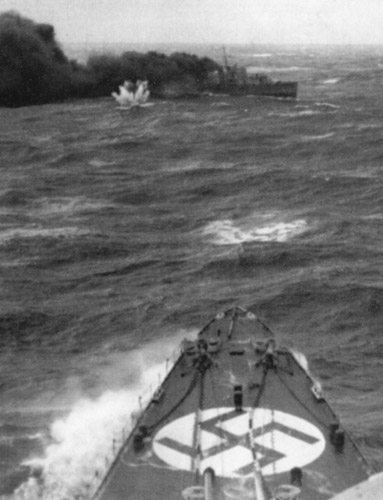Now It Can Be Told! - Our "Met" Men Fought Germans in the Arctic
The War Illustrated, Volume 9, No. 212, Page 205, August 3, 1945.
The arctic wastes of Spitsbergen were in 1942 the scene of a great Allied adventure – it was disclosed on June 9, 1945 – when a small meteorological party, established there to obtain vital weather information for the North Russian Convoy system, waged a five-months' “war” against Nazi meteorologists carrying out a similar task in a neighbouring fjord. For months they carried on, using a disused coalmine as shelter against ceaseless enemy air attack; while R.A.F. Coast Command flying-boats kept them alive by dropping frequent supplies and evacuating wounded, as well as themselves carrying out valuable meteorological flights. Eventually, the enemy left the area, and the Allied scientists secured the all-important data.
The “Met” force arrive at Barentsburg, in Ice Fjord, on May 13, 1942 – under the enemy's noses. The following day, while they were breaking the ice in Green Harbour, their ships were viciously attacked by four Focke-Wulf 200s. Only two of the 40 men sheltering behind tiny hummocks on the ice were, hit, however; although heavier casualties were sustained on the ships. Food, arms and clothing were lost, but the party managed to make do with old padded jerkins left behind by former Russian mineralogists, with dentists' white coats and bed-lines from the same source as camouflage.
Previous and next article from Now It Can Be Told!
Now It Can Be Told! - Phantom Patrols: G.H.Q. Liaison Regiment
Commanded by Lieut.-Col. A. H. McIntosh, this remarkable organization founded by Maj.-Gen. Hopkinson (killed while commanding the 1st Airborne Division in Italy) began secret operations early in 1940,
Now It Can Be Told! - Last Glorious Fight of the Glowworm
In one of the most daring and courageous sea-battles of the war, the British destroyer H.M.S. Glowworm, of 1,345 tons, fought a single-handed duel at point-blank range with the 10,000-ton German cruis
Index
Previous article
Secret Service Agents Helped to Win the War
The suggestion recently made in the U.S.A. that they should endeavour to build up an Intelligence Service on the British model is a compliment even greater than that paid to us after the 1914-18 war b
Next article
New Zealand's Fighting Ships and Men at War
A recent official message expressing appreciation of the very valuable services rendered by the R.N.Z.N. contained the passage: “The Board of the Admiralty and the officers and men of the Royal Navy a




